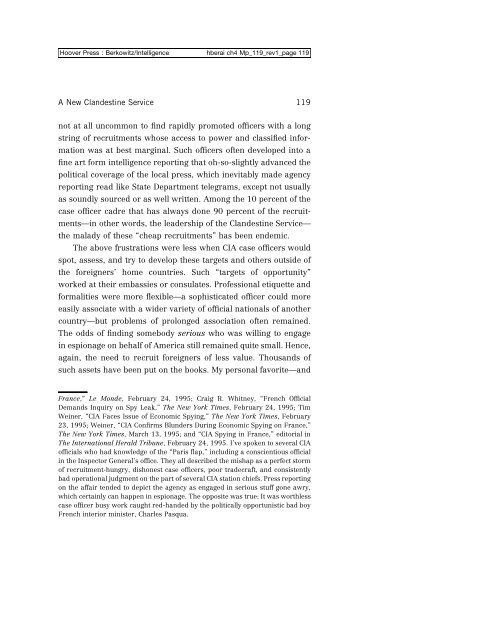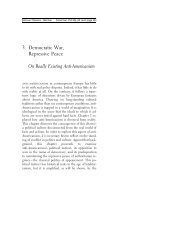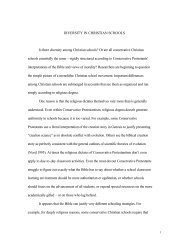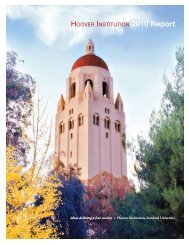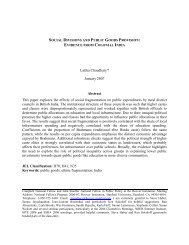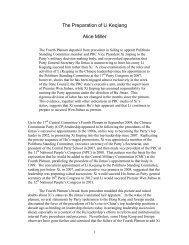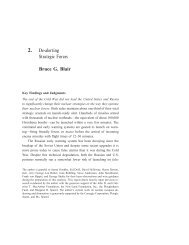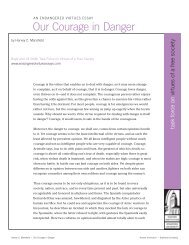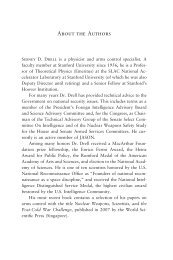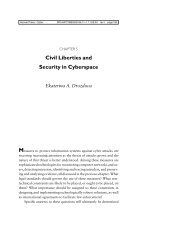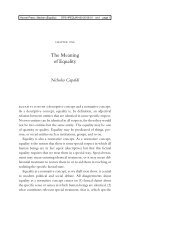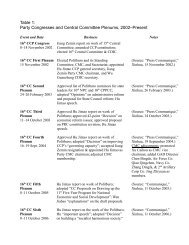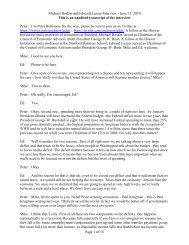A New Clandestine Service: The Case for ... - Hoover Institution
A New Clandestine Service: The Case for ... - Hoover Institution
A New Clandestine Service: The Case for ... - Hoover Institution
Create successful ePaper yourself
Turn your PDF publications into a flip-book with our unique Google optimized e-Paper software.
<strong>Hoover</strong> Press : Berkowitz/Intelligence hberai ch4 Mp_119_rev1_page 119<br />
A <strong>New</strong> <strong>Clandestine</strong> <strong>Service</strong><br />
119<br />
not at all uncommon to find rapidly promoted officers with a long<br />
string of recruitments whose access to power and classified in<strong>for</strong>mation<br />
was at best marginal. Such officers often developed into a<br />
fine art <strong>for</strong>m intelligence reporting that oh-so-slightly advanced the<br />
political coverage of the local press, which inevitably made agency<br />
reporting read like State Department telegrams, except not usually<br />
as soundly sourced or as well written. Among the 10 percent of the<br />
case officer cadre that has always done 90 percent of the recruitments—in<br />
other words, the leadership of the <strong>Clandestine</strong> <strong>Service</strong>—<br />
the malady of these “cheap recruitments” has been endemic.<br />
<strong>The</strong> above frustrations were less when CIA case officers would<br />
spot, assess, and try to develop these targets and others outside of<br />
the <strong>for</strong>eigners’ home countries. Such “targets of opportunity”<br />
worked at their embassies or consulates. Professional etiquette and<br />
<strong>for</strong>malities were more flexible—a sophisticated officer could more<br />
easily associate with a wider variety of official nationals of another<br />
country—but problems of prolonged association often remained.<br />
<strong>The</strong> odds of finding somebody serious who was willing to engage<br />
in espionage on behalf of America still remained quite small. Hence,<br />
again, the need to recruit <strong>for</strong>eigners of less value. Thousands of<br />
such assets have been put on the books. My personal favorite—and<br />
France,” Le Monde, February 24, 1995; Craig R. Whitney, “French Official<br />
Demands Inquiry on Spy Leak,” <strong>The</strong> <strong>New</strong> York Times, February 24, 1995; Tim<br />
Weiner, “CIA Faces Issue of Economic Spying,” <strong>The</strong> <strong>New</strong> York Times, February<br />
23, 1995; Weiner, “CIA Confirms Blunders During Economic Spying on France,”<br />
<strong>The</strong> <strong>New</strong> York Times, March 13, 1995; and “CIA Spying in France,” editorial in<br />
<strong>The</strong> International Herald Tribune, February 24, 1995. I’ve spoken to several CIA<br />
officials who had knowledge of the “Paris flap,” including a conscientious official<br />
in the Inspector General’s office. <strong>The</strong>y all described the mishap as a perfect storm<br />
of recruitment-hungry, dishonest case officers, poor tradecraft, and consistently<br />
bad operational judgment on the part of several CIA station chiefs. Press reporting<br />
on the affair tended to depict the agency as engaged in serious stuff gone awry,<br />
which certainly can happen in espionage. <strong>The</strong> opposite was true: It was worthless<br />
case officer busy work caught red-handed by the politically opportunistic bad boy<br />
French interior minister, Charles Pasqua.


